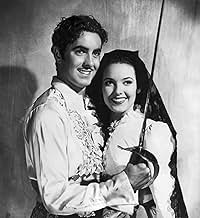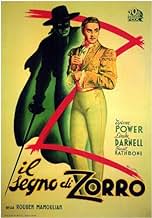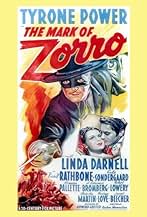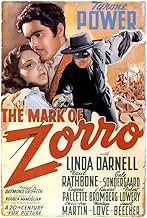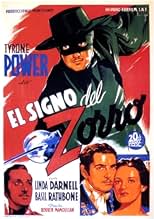NOTE IMDb
7,5/10
12 k
MA NOTE
Un jeune aristocrate doit prétendre être un dandy pour protéger son identité secrète de Zorro alors qu'il rétablit la justice dans la Californie naissante.Un jeune aristocrate doit prétendre être un dandy pour protéger son identité secrète de Zorro alors qu'il rétablit la justice dans la Californie naissante.Un jeune aristocrate doit prétendre être un dandy pour protéger son identité secrète de Zorro alors qu'il rétablit la justice dans la Californie naissante.
- Réalisation
- Scénario
- Casting principal
- Nommé pour 1 Oscar
- 4 victoires et 1 nomination au total
Ed Agresti
- Caballero
- (non crédité)
Avis à la une
The only ingredient missing here is a Fox budget that would have provided Technicolor photography as a part of the film's lush production values. However, even without three-strip Technicolor, this B&W version of the famous legendary outlaw is acted to perfection by the entire cast.
Tyrone Power goes with great ease from the fop to the swashbuckler Zorro, all the while displaying a great deal of charm and good looks. The romantic role of "the girl" goes to Linda Darnell who is more than adequate in the looks department herself.
In the chapel scene and "The White Sombrero" dance routine they have a chance to show the kind of sparks that made them popular movie stars of the '40s. Linda was just about to break out of her virginal roles and about to play more tempestuous heroines, but she does an excellent job as Power's love interest.
Basil Rathbone is at his finest for the final dueling scene, surely even more robustly performed than the one he shared with Errol Flynn in THE ADVENTURES OF ROBIN HOOD--and that's really saying something. Power seems to be evenly matched with Rathbone in his skilled swordsmanship.
Alfred Newman's fitting pseudo-Spanish background music provides just the right amount of excitement to make this a most entertaining show. And the supporting cast--including Gale Sondergaard, J. Edgar Bromberg, Eugene Palette, Montagu Love, Janet Beecher and others is excellent.
By all means worth watching anytime for sheer entertainment.
Tyrone Power goes with great ease from the fop to the swashbuckler Zorro, all the while displaying a great deal of charm and good looks. The romantic role of "the girl" goes to Linda Darnell who is more than adequate in the looks department herself.
In the chapel scene and "The White Sombrero" dance routine they have a chance to show the kind of sparks that made them popular movie stars of the '40s. Linda was just about to break out of her virginal roles and about to play more tempestuous heroines, but she does an excellent job as Power's love interest.
Basil Rathbone is at his finest for the final dueling scene, surely even more robustly performed than the one he shared with Errol Flynn in THE ADVENTURES OF ROBIN HOOD--and that's really saying something. Power seems to be evenly matched with Rathbone in his skilled swordsmanship.
Alfred Newman's fitting pseudo-Spanish background music provides just the right amount of excitement to make this a most entertaining show. And the supporting cast--including Gale Sondergaard, J. Edgar Bromberg, Eugene Palette, Montagu Love, Janet Beecher and others is excellent.
By all means worth watching anytime for sheer entertainment.
In Madrid, the talented aristocratic military swordsman and rider Diego Vega (Tyrone Power) returns to the Mexican California to reunite with his father, the Alcalde Don Alejandro Vega (Montagu Love), and his mother. When he arrives in Los Angeles, he finds that his father has been replaced by the tyrannous Alcalde Don Luis Quintero (J. Edward Bromberg) that oppresses the people with soaring taxes and violent punishment for those that can not afford and supported by the corrupt Captain Esteban Pasquale (Basil Rathbone) and his soldiers. Don Diego does not disclose his abilities with the sword and disguises pretending that he is a sophisticated fashionable gay, for the heartache of his father. However, when he secretly wears a mask and rides a black horse, he becomes the avenger Zorro that carves his mark for the fearfulness of his enemies.
"The Mark of Zorro" is the best Zorro of the cinema history in a time when the studios were concerned with the screenplay and acting and not CGI and sex scenes. The witty delightful story presents Tyrone Power as a fantastic the weak and fragile Don Diego Vega and the powerful Zorro, with totally different personalities. His ability as swordsman and rider is impressive in a perfect choreography of fights, recalling Errol Flynn in "The Adventures of Robin Hood" of two years before. Linda Darnell is so sweet and beautiful that seems to be the inspiration for the title of the novel of Vladimir Nabokov. J. Edward Bromberg and Basil Rathbone are the perfect villains, the first one coward and sleazy and the second arrogant and corrupt. My vote is ten.
Title (Brazil): "A Marca do Zorro" ("The Mark of Zorro")
"The Mark of Zorro" is the best Zorro of the cinema history in a time when the studios were concerned with the screenplay and acting and not CGI and sex scenes. The witty delightful story presents Tyrone Power as a fantastic the weak and fragile Don Diego Vega and the powerful Zorro, with totally different personalities. His ability as swordsman and rider is impressive in a perfect choreography of fights, recalling Errol Flynn in "The Adventures of Robin Hood" of two years before. Linda Darnell is so sweet and beautiful that seems to be the inspiration for the title of the novel of Vladimir Nabokov. J. Edward Bromberg and Basil Rathbone are the perfect villains, the first one coward and sleazy and the second arrogant and corrupt. My vote is ten.
Title (Brazil): "A Marca do Zorro" ("The Mark of Zorro")
Tyrone Power - the swashbuckling answer to Errol Flynn - is cast as the agile masked avenger who decides to take up the people's cause in disguise leaving his 'mark' "Z" everywhere, on walls, coach, wooden barrels and human chest...
Power - in a double leading role - is at his best as Zorro, climbing, jumping, riding and fencing, determined to finish with tyranny and oppression by terrorizing, and retrieving taxation funds and by challenging a cunning officer, proving in public his indifference, his ostentation and irony as a perfect pacifist fop in 19th-Century Spanish California, confusing and deceiving his aristocratic father Don Alejandro Vega (Montagu Love), the deposed Alcalde...
The inspired casting (in supporting roles) recalls "The Adventures of Robin Hood."
Linda Darnell is the pretty Lolita, Quintero's charming niece, who loves the mysterious hero and can't tolerate the fop until she is told that they are the image of the same person...
Basil Rathbone, one of the most durable of screen villains who has mastered stage fencing but never won a Swordfight, plays the cruel captain Esteban Pasquale, the Alcalde's military adviser... He is a second-rate soldier of fortune who leads the campaign of frustrating taxation, who considered Diego "a fancy clown" but who suggests a practical plan, an alliance for the good of the state...
J. Edward Bromberg is the cowardly Alcalde, Don Luis Quintero, a corrupted thief, enemy of the people, whose tyranny and avarice are always enforced by the treachery of his iron hand, the rigorous captain Esteban...
Eugene Palette plays the mission 'fat' priest (Father Felipe) who ignores that Diego is the opposing force...
The high point of the picture is the fantastic duel between Power and Rathbone, a masterpiece of screen Swordplay...
Rouben Mamoulian succeeds in making two great stars dance to an unheard music... With a touch of a great filmmaker, Mamoulian mixes harmoniously movement and action, decor and lightning with rage and turmoil, heroism and romance...
Under Alfred Newman's Oscar-Nominated score and despite the unusual absence of Technicolor, the film (the first of the great Tyrone Power swashbucklers ) is great fun, full of vitality and suspense, an exciting, deliciously ironic swashbuckler...
Power - in a double leading role - is at his best as Zorro, climbing, jumping, riding and fencing, determined to finish with tyranny and oppression by terrorizing, and retrieving taxation funds and by challenging a cunning officer, proving in public his indifference, his ostentation and irony as a perfect pacifist fop in 19th-Century Spanish California, confusing and deceiving his aristocratic father Don Alejandro Vega (Montagu Love), the deposed Alcalde...
The inspired casting (in supporting roles) recalls "The Adventures of Robin Hood."
Linda Darnell is the pretty Lolita, Quintero's charming niece, who loves the mysterious hero and can't tolerate the fop until she is told that they are the image of the same person...
Basil Rathbone, one of the most durable of screen villains who has mastered stage fencing but never won a Swordfight, plays the cruel captain Esteban Pasquale, the Alcalde's military adviser... He is a second-rate soldier of fortune who leads the campaign of frustrating taxation, who considered Diego "a fancy clown" but who suggests a practical plan, an alliance for the good of the state...
J. Edward Bromberg is the cowardly Alcalde, Don Luis Quintero, a corrupted thief, enemy of the people, whose tyranny and avarice are always enforced by the treachery of his iron hand, the rigorous captain Esteban...
Eugene Palette plays the mission 'fat' priest (Father Felipe) who ignores that Diego is the opposing force...
The high point of the picture is the fantastic duel between Power and Rathbone, a masterpiece of screen Swordplay...
Rouben Mamoulian succeeds in making two great stars dance to an unheard music... With a touch of a great filmmaker, Mamoulian mixes harmoniously movement and action, decor and lightning with rage and turmoil, heroism and romance...
Under Alfred Newman's Oscar-Nominated score and despite the unusual absence of Technicolor, the film (the first of the great Tyrone Power swashbucklers ) is great fun, full of vitality and suspense, an exciting, deliciously ironic swashbuckler...
This movie was directed by Rouben Mamoulian and this was basically the only action movie he directed and probably his best film, he made one more movie with Tyrone Power a year later called Blood And Sand and that was pretty bad. This is also one of Power's best movies and much better than Jesse James the year before. Their isn't much to the plot that you need to know like Power coming back from Spain and finding his father thrown out of power by a dictator and the people are starving. His father can't or won't do anything so Power decides to become Zorro. Basil Rathbone is the dictator's top bodyguard and a top swordsman. Linda Darnell is the dictator's daughter who winds up getting married to Power through an arranged marriage. This is much better then the remake in 98 called The Mask Of Zorro and a great movie.
This is what I can't help but like about the old high seas adventures and swashbuckling romances of the 1930s and '40s. You know, the ones where you can always hear Alfred Newman's bombastic score. The Mask of Zorro opens with a title card saying, "Madrid - when the Spanish Empire encompassed the globe, and young blades were taught the fine and fashionable art of killing
" So what's that, like 18...30? 1840? I guess we'll figure it out. And so we do, of course. But there was an unabashed syrupy-ness about the melodramatic urgency given to these movies.
When Zorro's not prancing around in his little cape eye-mask, he's playing the part of the utterly timid, and more than a touch effeminate, Don Diego Vega. The likelihood that Vega could be the remarkably expert swashbuckler never once dawns on the baddies, largely because Vega is such a stern little prude.
The first big-budget talkie starring the swashbuckling samaritan, Rouben Mamoulian's old-fashioned jaunt was a blockbuster in 1940, and it remains recalled quite warmheartedly by the Silent Generation's moviegoers, and equally the small screen's fascinated beginners among the Baby Boom, as one of the period's very best adventure pictures. One grows accustomed to the movie's qualitative foothold in that time of matinée idols and sword-fighting silver-screen hero worship, and we can concede for that reason. But tolerant filmgoers will stay open for a movie that's considerably chock-a-block with romance, action, duplicity, and courageous bravado, all in an overstated manner that could've only been taken seriously in 1940, and perhaps not one year later.
The nuts and bolts are all here: Don Diego is invited to come home from Madrid to his family in Los Angeles, but upon his reappearance he learns that his father's standing as "alcalde" has been seized by the shameless Don Luis Quintero, a nasty piece of work who's nothing more than a minion to the man enjoying the real supremacy: Captain Esteban Pasquale. As expected, Diego/Zorro means to linger in Los Angeles just long enough to depose the scoundrels, entice a pretty slice of illicit fruit, and bring integrity to his family's native soil. Nothing ground-breaking here, but there's nothing amiss in a straightforward adventure yarn told in the traditional way.
When Zorro's not prancing around in his little cape eye-mask, he's playing the part of the utterly timid, and more than a touch effeminate, Don Diego Vega. The likelihood that Vega could be the remarkably expert swashbuckler never once dawns on the baddies, largely because Vega is such a stern little prude.
The first big-budget talkie starring the swashbuckling samaritan, Rouben Mamoulian's old-fashioned jaunt was a blockbuster in 1940, and it remains recalled quite warmheartedly by the Silent Generation's moviegoers, and equally the small screen's fascinated beginners among the Baby Boom, as one of the period's very best adventure pictures. One grows accustomed to the movie's qualitative foothold in that time of matinée idols and sword-fighting silver-screen hero worship, and we can concede for that reason. But tolerant filmgoers will stay open for a movie that's considerably chock-a-block with romance, action, duplicity, and courageous bravado, all in an overstated manner that could've only been taken seriously in 1940, and perhaps not one year later.
The nuts and bolts are all here: Don Diego is invited to come home from Madrid to his family in Los Angeles, but upon his reappearance he learns that his father's standing as "alcalde" has been seized by the shameless Don Luis Quintero, a nasty piece of work who's nothing more than a minion to the man enjoying the real supremacy: Captain Esteban Pasquale. As expected, Diego/Zorro means to linger in Los Angeles just long enough to depose the scoundrels, entice a pretty slice of illicit fruit, and bring integrity to his family's native soil. Nothing ground-breaking here, but there's nothing amiss in a straightforward adventure yarn told in the traditional way.
Le saviez-vous
- AnecdotesThe famous duel was staged by Hollywood fencing master Fred Cavens. He specialized in staging duels that relied more on real swordplay rather than the jumping on furniture and leaping from balconies that many film duels incorporated up until that point. Cavens' son, Albert Cavens, doubled for Tyrone Power in the fancier parts of the duel (mostly with his back to camera), such as the extended exchange with Esteban ending with Don Diego's sword smashing into the bookcase. Basil Rathbone, a champion fencer in real life, did not care for the saber (the weapon of choice in this film), but nevertheless did all of his own fencing. Fast fencing shots were under-cranked to 18 or 20 frames per second (as opposed to the standard 24fps) and all the sound effects were post-synchronized.
- GaffesThe character "Captain Esteban Pasquale" uses the Italian spelling for his surname. The Spanish spelling is Pascual. While a subsequent addition to this entry has sought to attribute it to the presence of Italian mercenaries in the Spanish army of the period, the inescapable fact is that the screenwriter had more important things to attend to than inject such a trivial historical footnote. He misspelled Pascual's name in the script (made obvious by Basil Rathbone's pronouncing it in the two-syllable Spanish form, pas-KWAL), and that misspelling was then incorporated in the copy provided the department that drew up the film's end title.
- Citations
Captain Esteban Pasquale: His Excellency will never forgive me if I let you go without a word of welcome from him. I'm quite sure that you'll save me a reprimand.
Don Diego Vega: How could I refuse a man anything with a naked sword in his hand?
- Crédits fousOpening credits prologue: MADRID - when the Spanish Empire encompassed the globe, and young blades were taught the fine and fashionable art of killing ...
- Versions alternativesAlso available in a colorized version.
- ConnexionsEdited into Myra Breckinridge (1970)
Meilleurs choix
Connectez-vous pour évaluer et suivre la liste de favoris afin de recevoir des recommandations personnalisées
Détails
- Date de sortie
- Pays d’origine
- Langues
- Aussi connu sous le nom de
- La marca del Zorro
- Lieux de tournage
- Société de production
- Voir plus de crédits d'entreprise sur IMDbPro
Box-office
- Budget
- 1 000 000 $US (estimé)
- Montant brut mondial
- 10 248 $US
- Durée1 heure 34 minutes
- Couleur
- Rapport de forme
- 1.37 : 1
Contribuer à cette page
Suggérer une modification ou ajouter du contenu manquant


